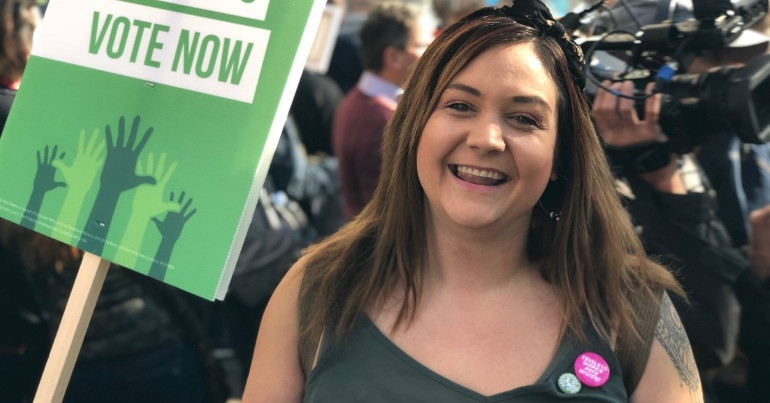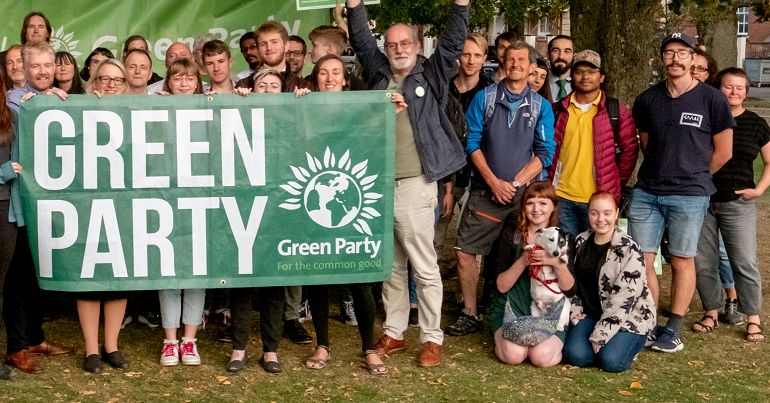Interview with Hannah Graham – GPEx campaigns coordinator candidate

Throughout August, members of the Green Party for England & Wales will be voting to elect members of the next Green Party Executive (GPEx). In all, members will vote to determine which representatives will carry out eleven different roles – including that of leader and deputy leader. There is also a ballot to determine who will be the party’s third member in the House of Lords should the party be asked to put forward another peer.
Former Young Greens co-chair Hannah Graham is standing for campaigns coordinator. This August, she’ll be going up against Britta Goodman and Daniel Laycock.
We asked each of the candidates five questions on their background and what they would seek to achieve on GPEx. Here are Hannah’s responses:
What do you think are the main challenges currently facing the Green Party, and how would you work to overcome them?
From its very start, our party emerged from powerful social movements and campaigns for progressive change. Campaigning is and always has been a vital thread in the fabric of our party and movement. And campaigning is in my blood.
For far too long, I have attended demonstrations and supported campaigns where the Green Party has appeared to be in the background. It’s time for the party to have an equal stake in campaigning, especially when we have the right policies to back our actions up! I have the right skills and experience to achieve this.
I believe that Green Party campaigns must be evidence-based, relevant and formed through interactions and partnerships with pressure groups and civil society.
Recent attacks on our basic human rights have shown that more than ever we need campaigners to face threats head-on and mobilise people for a progressive alternative. It’s important our campaigns are relevant and spearheaded by people with lived experience.
What skills do you bring that would make you an effective member of the executive?
I have been a Party member for 6 years, and am a former Young Greens Co-Chair, GPEx member and parliamentary candidate. I come from Scunthorpe in Lincolnshire, but over the last four years, have lived in London, where I’ve stood as a local elections candidate, and am on the candidate list for next year’s London Assembly elections.
It was defending free education on my university campus that inspired me to take action against the growing inter-generational and cultural divides in our society. After being elected to the role of Vice President of my students’ union, I led the free education strikes on campus, joined the Green Party then stood as the first ever Green Party parliamentary candidate in Middlesbrough in 2015.
I’m an experienced policy specialist and campaigner, with 8 years’ experience in professional campaigning roles in youth policy, gender equality and international development. I am a progressive and radical campaigner, a believer in direct action, and an advocate for diversity and inclusion of marginalised groups.
What campaigns have you been a part of that you can draw experience from in this position?
Currently, I work full-time as Advocacy Manager for the World Association of Girl Guides and Scouts. In this role, I work with young women and girls from around the world to give them the tools they need to influence decision-makers on issues that disproportionately affect them.
I work at the grassroots level with hundreds of girls, empowering them to take action and speak out about a whole host of gendered injustices: malnutrition, gender-based violence and menstrual health to name just a few. My campaigning and advocacy work in the last year has led to Girl Guides in Tanzania meeting with their Prime Minister, and Girl Guides in Madagascar directly influencing an increase to their National Food and Agriculture budget.
In The Green Party, I am a former Young Greens Co-Chair. During this time I led campaigns on ending immigration detention and awareness building of the persecution that migrants and refugees face in our country. I led demonstrations to Yarl’s Wood immigration detention centre, led panel sessions and workshops giving migrants and refugees a platform to discuss their experiences and created campaigns packs and resources for local Young Greens groups to start their own campaigns on a grass-roots level.
More recently, I have been part of a campaign supporting the Macedonian Young Greens ahead of their general election this year, to request pledges from candidates on a whole host of LGBTQIA+ rights issues in the country. I also helped write policy scripts for the LGBTQIA+ Greens campaign around the Gender Recognition Act proposals.
What would you like to see the Green Party prioritising for its non-election campaigning?
We are quite simply, a political party. Political parties fight elections. Winning seats on all levels equates to decision-making power and influence, which we need to strive for to ensure Green policies become conventional.
Living in London, I can see first-hand just how hard Sian and Caroline work as our elected London Assembly members and how much impact they have had.
Occupying seats brings the power to challenge bad decisions made by other parties, and they have had successes in such a short time that would take years of campaigning, purely just by holding that seat and challenging the status quo. Occupying seats also helps us collect a brilliant winning record for the Greens to shout about.
However, we know we cannot win elections without appealing to the general public, so relevant and timely campaigns really matter.
To achieve a Just Transition away from a capitalist society, it is imperative these campaigns are tackling a holistic combination of environmental and social justice issues. We cannot be a single issue party.
The Green Party needs to focus on protection of our critical public services, healthcare, tackling the housing crisis, universal basic income, equalities, and of course, electoral reform to ensure we get the proportional representation we so vitally need to see in this country.
Most importantly, these campaigns should be spearheaded by people with lived experience to ensure we stay relevant to wider society and give people a platform to campaign about the issues that disproportionately affect them.
What campaign groups or social movements would you like to see the Green Party working in collaboration or solidarity with?
The party should form bonds with knowledgeable and active campaigning groups to attract more members and have an equal campaigning stake.
We need to connect to people in ways we haven’t before. We need to tackle real problems people are having in homes and communities. Renters rights, fuel and food poverty. There are already brilliant groups working on issues and policies we care about so let’s approach them, meet with them and form strong alliances. We claim to be the party for the marginalised, but this has been a missed opportunity.
I will make efforts to bridge the gap between The Green Party and campaigning groups, many of whom I already have great links with due to professional campaigning experience, and ensure that we are listening to the reasons they give us as to why they previously have not engaged with the party, or with our campaigns.
This interview is part of a series with each of the candidates in this year’s GPEx elections. You can find Bright Green’s full coverage of the elections here.
PS. We hope you enjoyed this article. Bright Green has got big plans for the future to publish many more articles like this. You can help make that happen. Please donate to Bright Green now.



What can I tell you? The author reveals the topic much better than all the others I have read. Write more – I will be happy to read everything that will be written here